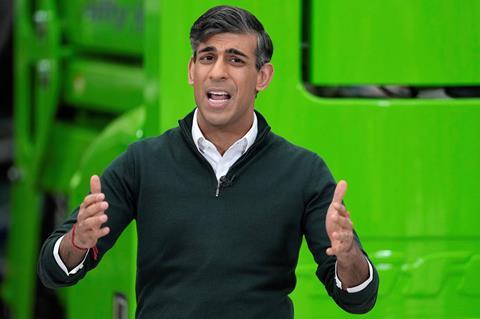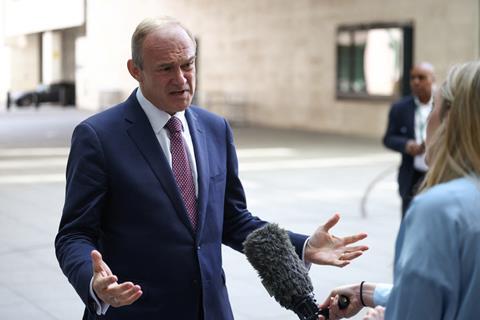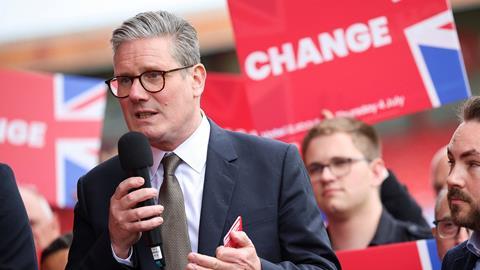With less than two weeks to go, here’s what the big hitters have to say on business rates, wages, worker rights, apprenticeships, taxes and more
With all the major manifestos now out, part four of our election analysis series looks to commitments on business and what impact they might have on the grocery and wider food and drink sectors.
Labour has courted the business community hard. At the start of the campaign, it released a letter from business leaders, including Iceland’s Malcolm and Richard Walker and Ella’s Kitchen founder Paul Lindley, backing the party.
But the lack of signatures from major CEOs suggested a courtship that remains cautious.
With Labour now as much as 200-1 at the bookies to form the next government, much focus has been on what that will mean for UK business and whether the party’s much-trumpeted quest for growth has resulted in genuinely business-friendly pledges and policies.
So what do the major parties represent when it comes to business and the economy?

Business rates
One particularly welcome – though somewhat familiar – pledge for the retail sector is Labour and Liberal Democrats both promising to overhaul the business rates regime.
Labour’s manifesto argues the current system “disincentivises investment, creates uncertainty and places an undue burden on our high streets”. The Lib Dems promise abolition as “our town centres and high streets are crying out for a fair business rates system”.
Labour says its “new system will level the playing field between the high street and online giants, better incentivise investment, tackle empty properties and support entrepreneurship” – but detail on what the new tax will be is scant.
“Pledging to replace business rates is the easy bit,” says Colliers head of business rates John Webber. “We need to be able to advise businesses on what kind of taxes they will be paying under a Labour government.”
The Lib Dems propose replacing rates with a ‘commercial landowner levy’, while also seeking to reduce the burden on physical shops and increase it for online delivery companies.
Read more:
-
Conservatives pledge retail crime clampdown and online rates rise
-
Lib Dems pledge to scrap business rates and establish recommended genuine living wage
-
Labour manifesto to include clampdown on ultra-processed food and takeaways
-
Will general election end environmental policy shambles?
The levy proposal looks like the resurrection of a Lib Dem policy set out in more detail in a 2018 report, titled ‘Replacing business rates: taxing land, not investment’, says Webber.
He sees the plan as “unrealistic”, arguing landlords will simply pass the new levy on. “The additional tax would result in landlords retrieving their lost income by hiking up the rents they charge to occupiers.
“Even more concerning is they admit [in the report] the system would not produce enough tax income and the gap would need to be filled – probably by raising corporation tax.”
Meanwhile, the Conservative manifesto’s commitments on business rates reform are “disappointing”, says Simon Green, head of business rates at property consultancy Gerald Eve.
The Tories have promised to “ease the burden of business rates for high street… by increasing the multiplier on distribution warehouses that support online shopping”.
But Green points out the multiplier is “amongst the highest of comparable property taxes in the western world” and increasing the rate for warehouses does not cut the rate for those currently penalised.
BRC CEO Helen Dickinson says: “It is hard to see it as a viable solution given the wide range of retailers that sell goods online as well as from stores.”

Minimum wage
The Conservative manifesto stresses its record of raising the national living wage from £5.80 in 2010 to £11.44 today. It pledges it will remain at two-thirds of median earnings, which is predicted to push it to £13 per hour by the end of the next parliament.
The other major parties baulk at the Greens’ £15 minimum wage commitment, but Labour has said it will ensure the “minimum wage is a genuine living wage”.
Most notably, Labour will also remove the “discriminatory” age bands for under-21s, so all adults are entitled to the same minimum wage. The Lib Dems also pledge to scrap the lower apprentice rate.
ACS CEO James Lowman says this will hit convenience stores as many “employ younger people to give them early work opportunities and to manage their employment costs”.
He adds: “The [Labour] manifesto commitment to extend the remit of the Low Pay Commission to account for the cost of living is currently too vague when businesses need certainty, with a fair and predictable long-term trajectory for the national living wage.”
Shore Capital analyst Clive Black says such a move would inevitably be “moderately inflationary”, albeit in a more settled pricing environment.
Read more:
-
Food sector bodies slam political parties for lax response on food security
-
Labour commits to reviving standalone offence for attacking shopworkers
-
General election: What are the main parties promising on food and farming?
-
Replacing apprenticeship levy and a ‘genuine living wage’ among key Labour manifesto pledges
Worker rights
One area Labour has consulted business on heavily is its ‘New Deal For Working People’.
Media reports it was to be heavily watered down on advice from business proved somewhat wide of the mark, with the manifesto pledging to ban “exploitative” zero-hours contracts, end “fire and rehire” tactics and grant basic worker rights from day one of employment, as well as repealing Conservative anti-strike legislation.
GlobalData retail analyst Oliver Maddison warns: “Retailers are likely to see slightly higher labour costs in the not-too-distant future, which may disincentivise job growth in the sector.”
But the BRC’s Dickinson plays down employer concern over the reforms: “Ensuring the three million retail workers in this country feel empowered and protected is something everyone should get behind.”
Black argues: “Business is not naive and so expects some roll-back of the present system.
“A more settled labour market, where availability and skill sets are improved, would be a much bigger prize for the people-heavy food system over these narrower policy moves.”

Apprenticeships
The Apprenticeship Levy has come under intense criticism, with John Lewis, Tesco, and M&S calling for a significant overhaul of a system they call damaging and restrictive.
The Conservatives say they have, since 2010, delivered 5.8 million apprenticeships and created apprenticeship routes into 70% of occupations.
Unsurprisingly, Labour agrees with the critics, promising to ditch the “Conservatives’ broken Apprenticeship Levy” and instead create a “flexible Growth & Skills Levy”. The Lib Dems have no love for the “broken” system either.
Dickinson says: “A flexible Growth & Skills Levy could provide just the answer retailers and their employees have been looking for.”
Read more:
-
Labour’s National Food Strategy aim is laudable, but will drive inflation
-
Campaigners hail Labour plans to ban energy drinks to under 16s
-
FWD urges electoral candidates to reform apprenticeship levy ahead of election
Business taxes
Corporation tax has been a political football recently, with the government cutting it from 28% to 19% for large business, before putting it back to 25%.
The Tories “will not raise corporation tax”, while looking to extend “full expensing” to leasing. Labour will cap corporation tax at the current level of 25% and retain full expensing on capital spending.
Those wanting more radical change will find it with Reform, which wants to zero-rate profits under £100k and cut the main corporate tax rate to 20% and then 15% by the end of parliament.

























No comments yet